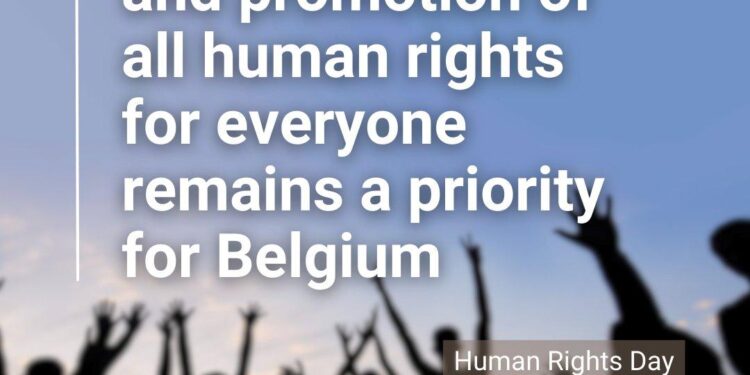The U.S. Department of State has released its 2024 Country Reports on Human Rights Practices, offering a comprehensive assessment of human rights conditions worldwide. Among the nations reviewed, Belgium features prominently, with detailed analysis highlighting key developments, challenges, and progress within the country over the past year. This report provides valuable insights into Belgium’s adherence to international human rights standards, covering issues such as freedom of expression, rule of law, and protection against discrimination. As global attention increasingly focuses on human rights accountability, the findings from the 2024 report shed light on Belgium’s efforts and areas requiring continued vigilance.
Overview of Human Rights Conditions in Belgium Highlighted in 2024 Report
Belgium’s 2024 human rights landscape reflects a complex interplay between progressive legislation and persistent challenges. The report underscores the government’s continued commitment to upholding freedom of expression, freedom of assembly, and protection against discrimination. However, issues relating to minority rights, particularly those of migrant communities and the Roma population, remain areas of concern. Authorities have intensified efforts in combating hate speech and xenophobia, yet reports of social exclusion and systemic discrimination persist in various regions.
Key factors highlighted in the report include:
- Judicial reforms: Steps taken to improve access to justice, though delays and procedural inefficiencies affect marginalized groups.
- Police conduct: While oversight mechanisms are in place, occasional incidents of excessive force and racial profiling are reported.
- Refugee and asylum seeker treatment: Enhanced reception conditions contrasted by concerns over detention practices and integration policies.
| Human Rights Aspect | Status in 2024 | Key Challenges |
|---|---|---|
| Freedom of Expression | Protected | Hate speech monitoring |
| Minority Rights | Improving | Systemic discrimination |
| Judicial Access | Partially Effective | Case backlogs |
Analysis of Freedom of Expression and Judicial Independence Concerns
The 2024 assessment reveals ongoing challenges to freedom of expression in Belgium, despite constitutional safeguards. Authorities have occasionally intervened in media reporting, particularly on sensitive issues related to national security and migration. While such actions are often justified by the government as necessary to maintain public order, critics argue they risk undermining the robust public discourse essential in a democratic society. Independent journalists and human rights organizations have voiced concerns over the increased use of legal measures that could intimidate reporters and curtail investigative journalism.
Judicial independence remains a cornerstone of Belgium’s democratic framework; however, certain factors have raised questions about its practical enforcement. Issues such as political appointments within the judiciary and occasional delays in case processing have fueled apprehension about impartiality and efficiency. The table below highlights recent data reflecting the public perception of judicial independence and interference concerns:
| Indicator | 2023 Score | 2024 Score |
|---|---|---|
| Public Confidence in Judiciary (%) | 72 | 68 |
| Reported Political Interventions | 5 | 7 |
| Case Backlog (months) | 3.2 | 3.7 |
- Freedom of expression pressures: Increased legal actions against media outlets.
- Judicial concerns: Slower case resolutions and perceived political influence.
- Calls for reform: Advocates urge stronger protections for independent journalism and judiciary.
Recommendations for Enhancing Protection of Minority Rights and Migrant Communities
To better safeguard the rights of minority groups and migrant communities within Belgium, policymakers are urged to institute more robust legal frameworks that explicitly prohibit discrimination in all sectors, including housing, employment, and education. Strengthening anti-hate crime legislation and ensuring swift enforcement can deter acts of bias and violence. Additionally, increasing funding for specialized support services-such as multilingual legal aid, culturally sensitive health care, and integration programs-will empower these communities to navigate societal challenges more effectively.
Community engagement must be prioritized through platforms that facilitate dialogue between minority groups, migrant representatives, and government bodies. This collaborative approach not only enhances mutual understanding but also informs policies that reflect lived experiences. The following table outlines critical focus areas alongside actionable measures recommended for enhancing protection:
| Focus Area | Recommended Measures |
|---|---|
| Legal Protections | Enact comprehensive anti-discrimination laws with clear enforcement mechanisms |
| Access to Services | Expand multilingual support and culturally appropriate social services |
| Community Dialogue | Create forums to foster cooperation and policy feedback loops |
| Education & Awareness | Implement nationwide campaigns addressing prejudice and promoting inclusivity |
Wrapping Up
The 2024 Country Reports on Human Rights Practices provide a detailed and critical assessment of Belgium’s human rights landscape, underscoring both progress and ongoing challenges. As these findings reach policymakers, advocates, and the international community, they serve as a crucial benchmark for accountability and reform. Continued monitoring and engagement will be essential to ensure that Belgium upholds its commitments to human rights protections in the year ahead.
















